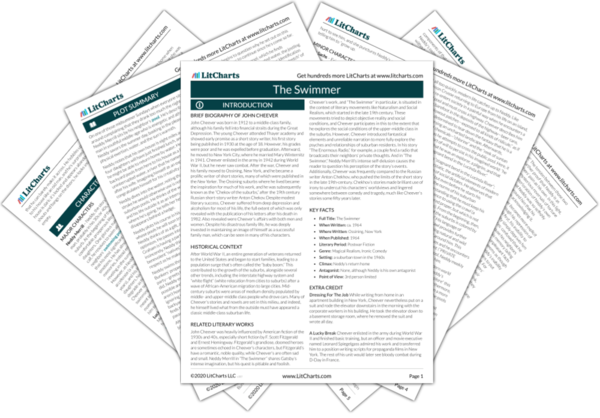In “The Swimmer,” alcohol symbolizes Neddy’s short-sighted hedonism, showing that pleasure pursued too hungrily ends in disaster. Cheever announces the significance of alcohol to the social life of the suburbs in the first paragraph of the story, where hungover residents complain that they “drank too much” the night before. Immediately, Cheever links alcohol with excess and regret, but he introduces Neddy as he’s still in the early stages of intoxication, at the pool with a hand around “a glass of gin.” As he swims through his neighbors’ backyards, Neddy finds a drink at nearly every stop, a social courtesy that, at first, he accepts and enjoys: stumbling on the Bunkers’ party, he admires “prosperous men and women gathered by the sapphire colored waters while caterer’s men in white coats passed them cold gin.” However, Cheever’s portrayal of alcohol changes as Neddy gets further into his swim (and, presumably, gets drunker). While trespassing in the Levys’ empty backyard, Neddy swims in the pool then helps himself to a drink all alone—here, alcohol becomes less a social pleasure than a compulsion. This becomes explicit after he swims in the Hallorans’ pool and thinks to himself for the first time that he needs a drink to maintain his mood; from here on, finding alcohol is nearly as important to Neddy as his quest to swim home. Indeed, the notion that alcohol might be a problem for Neddy becomes clearest at the Biswangers’ party, where people are gossiping that Neddy had once “showed up drunk” and asked for a loan. Throughout the story, alcohol mirrors Neddy’s foolish quest to swim the county: it’s a light pleasure that turns into an all-consuming compulsion, one that poisons his life and ruins his relationships to others.
Alcohol Quotes in The Swimmer
It was one of those midsummer Sundays when everyone sits around saying, “I drank too much last night.” You might have heard it whispered by the parishioners leaving church, heard it from the lips of the priest himself, struggling with his cassock in the vestiarium, heard it from the golf links and the tennis courts, heard it from the wildlife preserve where the leader of the Audubon group was suffering from a terrible hangover.

Unlock explanations and citation info for this and every other The Swimmer quote.
Plus so much more...
Get LitCharts A+The rain had cooled the air and he shivered. The force of the wind had stripped a maple of its red and yellow leaves and scattered them over the grass and the water. Since it was midsummer the tree must be blighted, and yet he felt a peculiar sadness at this sign of autumn. He braced his shoulders, emptied his glass, and started for the Welchers’ pool.
The next pool on his list, the last but two, belonged to his old mistress, Shirley Adams. If he had suffered any injuries at the Biswangers’ they would be cured here. Love—sexual roughhouse in fact—was the supreme elixir, the pain killer, the brightly colored pill that would put the spring back into his step, the joy of life in his heart. They had had an affair last week, last month, last year. He couldn’t remember.












